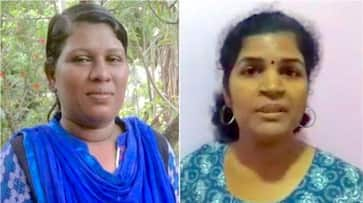Kanakadurga and Bindu on Wednesday said to the Supreme Court that they are planning to enter the Sabarimala shrine again on its opening on February 12.
Thiruvananthapuram: Kanakadurga and Bindu who entered the Sabarimala shrine on January 2, told the Supreme Court on Wednesday about their resolve to enter the temple again on February 12.
"They are facing social exclusion as well as a social boycott for just entering the temple as allowed by the Supreme Court in its verdict," senior advocate Indira Jaising, appearing for the women, told a five-judge constitution bench headed by Chief Justice Ranjan Gogoi.
The bench reserved its verdict on the Sabarimala petition review hearing on Wednesday. Sabarimala has been a talking point across the nation with state-wide hartals and numerous clashes that took place after the women entered the shrine.
Jaisingh told the bench, also comprising Justices RF Nariman, AM Khanwilkar, D Y Chandrachud and Indu Malhotra, that a case for review of the September 28, 2018 judgement is not made out and there is no law which can stop women from entering the shrine.
The resolve to maintain tradition on one hand and to enter the shrine on the other has torn people apart in the state. Just when the clashes to an extent has simmered down, the pot seems to have been stirred again.
"My right of practice and professing any religion is protected under the Constitution. Nothing can stop me from having a darshan of Lord Ayappa and entering the temple under the law," she said, adding that exclusion is derogatory to the dignity of women and hurts the core of the principles enshrined in the constitution.
Bindu and Kanakadurga have also filed a contempt petition against the temple 'Thantri' and authorities.
However, the chief priest of the temple maintains his position. In a written response to the Devaswom commission inquiry on February 4, Kandararu Rajeevaru said that he will perform Suddhikalasam (purification rites) again if necessary.
Contrary to the chief priest’s belief, senior court advocate Jaising said that after the two women succeeded in entering the temple, a purification ritual was carried out in the temple which was in violation of the apex court order.
She said in India there is concept of a private temple, but Sabarimala temple is considered to be a public place and therefore to say that Article 15 (2) of the Constitution does not apply is incorrect.
Jaising brought to the notice of the bench that Bindu, a Dalit Hindu woman after entering the temple was facing social boycott and exclusion to the extent that even the shopkeepers are asking her to stop visiting their shops.
Her mother also received a death threat because of her daughter making it to the Sabarimala shrine, she said.
Recounting these instance gives the people a Kerala a look back on their actions and deeds that have left the state in the position that it is.
Despite the prior consequences, both Kanakadurga and Bindu look forward to revisiting the shrine.
Could the circle run its course for a second time with hartals and clashes after the temple reopens on February 12?
Last Updated Feb 7, 2019, 7:38 PM IST









![Salman Khan sets stage on fire for Anant Ambani, Radhika Merchant pre-wedding festivities [WATCH] ATG](https://static-gi.asianetnews.com/images/01hr1hh8y86gvb4kbqgnyhc0w0/whatsapp-image-2024-03-03-at-12-24-37-pm_100x60xt.jpg)
![Pregnant Deepika Padukone dances with Ranveer Singh at Anant Ambani, Radhika Merchant pre-wedding bash [WATCH] ATG](https://static-gi.asianetnews.com/images/01hr1ffyd3nzqzgm6ba0k87vr8/whatsapp-image-2024-03-03-at-11-45-35-am_100x60xt.jpg)


